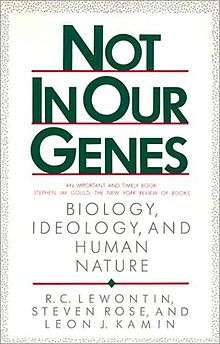Not in Our Genes
 | |
| Author | Richard Lewontin, Steven Rose, Leon Kamin |
|---|---|
| Language | English |
| Subject | Sociobiology |
| Published | 1984 (Pantheon Books) |
| Media type | Print (hardcover and paperback) |
| Pages | 322 |
| ISBN | 0-14-013525-1 |
Not in Our Genes: Biology, Ideology and Human Nature is a 1984 book by evolutionary geneticist Richard Lewontin, neurobiologist Steven Rose and psychologist Leon Kamin, who criticize sociobiology and genetic determinism.[1] The authors, who are informed by Marxism,[1] have been criticized for misrepresenting the views of scientists such as Edward O. Wilson and Richard Dawkins.[2]
Summary
Lewontin, Rose and Kamin make a strong statement about the entanglement of science and politics: "Science is the ultimate legitimator of bourgeois ideology", and makes the following comparison "If biological determinism is a weapon in the struggle between classes, then the universities are weapons factories, and their teaching and research faculties are the engineers, designers, and production workers".[3] Lewontin, Rose and Kamin discuss and criticize the views of authors such as Edward O. Wilson, Richard Dawkins, and Donald Symons. They maintain that, like some other sociobiologists, Symons maintains that "the manifest trait is not itself coded by genes, but that a potential is coded and the trait only arises when the appropriate environmental cue is given." In their view, "Despite its superficial appearance of dependence on environment, this model is completely genetically determined, independent of the environment." They write that Symons' arguments in The Evolution of Human Sexuality (1979) provide examples "of how sociobiological theory can explain anything, no matter how contradictory, by a little mental gymnastics".[4]
Reception
In reply to Lewontin, Rose, and Kamin's criticism, Dawkins defended the "perfectly sensible belief" in reductionist arguments of viewing properties of the whole "in terms of its parts", which he saw in the book as (ironically) reduced to "an idiotic travesty", "that the properties of a complex whole are simply the sum of those same properties in the parts". He also accused the authors of giving "ideology priority over truth",[3] and of promoting a "bizarre conspiracy theory of science". Accusing them of lies and idiocy, he concluded that Not in Our Genes is "silly, pretentious, obscurantist and mendacious".[5]
Biologist Dean Hamer considered Not in Our Genes a political rather than a scientific book, and disliked its politics. Nevertheless, the book taught Hamer that the genetics of human behavior, especially of sexuality, is an emotionally charged topic, and partly motivated him to change fields from metallothionein research to the genetics of homosexuality.[6] Author Richard Webster writes in Why Freud Was Wrong (1995) that Not in Our Genes as "a critique of sociobiology and genetic determinism which is, for the most part, much more subtle and valuable than the Marxism which frequently informs it."[1] Historian of science Roger Smith describes Not in Our Genes as an accessible critique of sociobiology.[7] Psychologist Steven Pinker criticized Not in Our Genes in his How the Mind Works (1997), where he wrote that Lewontin, Rose and Kamin drop "innuendos about Donald Symons's sex life" and misquote Richard Dawkins,[8] and again in The Blank Slate (2002), where he wrote that they use words such as "determinism" and "reductionism" as "vague terms of abuse", and misrepresent the views of scientists such as Wilson and Dawkins, falsely ascribing ridiculous beliefs to them.[2]
Publication
- Not in Our Genes: Biology, Ideology and Human Nature ISBN 0-14-022605-2
References
- 1 2 3 Webster, Richard (2005). Why Freud Was Wrong: Sin, Science and Psychoanalysis. Oxford: The Orwell Press. p. 611. ISBN 0-9515922-5-4.
- 1 2 Pinker, Steven (2003). The Blank Slate: The Modern Denial of Human Nature. London: Penguin Books. pp. 112–113. ISBN 0-140-27605-X.
- 1 2 Richard Dawkins, "Sociobiology: the debate continues", a review of Not in Our Genes: Biology, Ideology and Human Nature by Steven Rose, Leon J. Kamin and R.C.Lewontin (Pantheon Books, 1985), appeared in New Scientist 24 January 1985, web version
- ↑ Lewontin, Richard; Rose, Steven; Kamin, Leon (1990). Not in Our Genes: Biology, Ideology and Human Nature. London: Penguin Books. pp. 74–5, 253, 259–6, 262. ISBN 0-14-013525-1.
- ↑ Dawkins, C.R. Critical review in New Scientist by Richard Dawkins. New Scientist 24 January 1985
- ↑ Hamer, Dean; Copeland, Peter (1994). The Science of Desire: The Search for the Gay Gene and the Biology of Behavior. New York: Simon & Schuster. pp. 25–26. ISBN 0-671-88724-6.
- ↑ Smith, Roger (1997). The Norton History of the Human Sciences. New York: W. W. Norton & Company. p. 1006. ISBN 0-393-31733-1.
- ↑ Pinker, Steven (1997). How the Mind Works. London: Penguin Books. p. 45. ISBN 0-7139-9240-9.